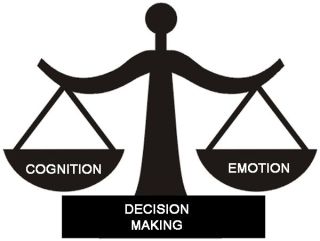Decision-Making
The Power of Emotions in Decision Making
How to use emotions constructively in decision making.
Updated August 7, 2023 Reviewed by Monica Vilhauer
Key points
- Emotions play a significant role in decision-making.
- Without emotions to motivate and push us, we would be passive and do nothing.
- Make sure to balance and integrate emotional insights with logical reasoning.
- Practice emotional intelligence skills to better your decisions.

Many would consider emotions to be a hindrance to decision-making and, therefore, think that they would be better off without them. They may avoid or suppress them, rather than feel, process and understand their meaning. When it comes to the decision-making process, they would prefer to be rational rather than emotional.
However, emotions have value. It appears that without emotions to motivate and push us, we would be passive and do nothing. Decisions are very much informed by our emotional state since this is what emotions are designed to do. Emotions quickly condense an experience, and evaluate it to inform our decision, so we can rapidly respond to the situation.
While emotions serve to direct us, they are driven by our automatic survival nature. As such, most of the time emotions communicate their messages below our level of awareness. It is important to note that because of their speed and survival purpose, emotions are not particularly accurate. Their speed and effectiveness compensate for what they lack in being specific and detailed. This is why the emotional system provides many false alarms, which requires us to reevaluate our response and check if it is appropriate to the particular situation.
The latest research has established that emotion is crucial in a rational decision-making process. Antonio Damasio and his colleagues concluded that in the absence of emotional markers, decision making is virtually unattainable. Our emotions will drive the conclusions we make, and our well-being may depend upon our ability to understand and interpret them while integrating them with a rational mind to make an appropriate decision. While it is important to consider and process emotional signals, we need to evaluate our responses and see if they are proper to the relevant situation.
How to use emotions to make effective decision-making?
Here are some steps to effectively use emotions for successful decision-making:
Welcome your emotions
Don’t repress or ignore your emotions. Start by identifying and understanding your emotions. Take a moment to recognize what you are feeling and why you are feeling. This mindful process of self-examination is critical to healthy decisions, since emotions can influence our views and judgments.
Remember “emotional bias”
Because of their survival nature, emotions can create biases that affect how we perceive information and interpret situations. Remember that the emotional brain cares more about being safe than about being correct. Listen to its alarm signal, and at the same time question its message.
Regulate your emotions
Emotions, especially at a high intensity, impact our ability to make rational decisions. Strong emotions can impair our judgment and make it challenging to think objectively and critically. This is why it is important to temper our emotions to be balanced and proportional to the situation.
Utilize emotions as a guide
Emotions can act as a compass, pointing you toward what matters most to you and/or what aligns with your values. However, it is essential to avoid letting emotions dictate your decision-making. Make sure to balance emotional insights with logical reasoning.
Enlist your rational mind
It is important to enlist the help of the rational mind. By doing so, you move from a system that operates quickly, intuitively, and unconsciously to a system that is slower and more controlled, rational, and conscious. You move beyond an impulsive, reactive emotional system to one that is contemplative, flexible, and strategic.
Consider the context
Evaluate the situation at hand and consider that emotions may be influenced by the context. Emotions that arise from past experiences or personal biases might cloud your judgment. Separate the present situation from the past and focus on the relevant factors.
Assemble relevant information
Emotions can provide valuable insights, but they should be complemented with factual information. Take your time to gather crucial information before making important decisions. Analyze the pros and cons of your options to make the best possible decisions.
Be mindful
Mindfulness is key to harmonizing the mind. The unregulated mind can become deluded, allowing passions, urges, and wild emotions to take over. Mindfulness allows us to notice our emotions and engage the rational mind to interpret their message. The goal is to treat your emotions as a gateway to a greater level of awareness.
Cultivate compassion
Cultivating compassion in decision making is a powerful way to make more empathetic, ethical, and balanced choices that consider the well-being of all. Compassion helps us soothe the emotional mind and choose actions that will benefit ourselves and others.
Practice emotional intelligence
Emotional intelligence is the ability to recognize and manage your emotions effectively. Key elements of emotional intelligence are self-awareness, self-regulation, motivation, empathy, and social skills. By developing emotional intelligence skills, you can use your emotions to inform your decisions without being controlled by them.
Reframe the situation
Reframing means consciously changing your way of thinking about the meaning of an emotionally charged situation in order to reduce negative feelings. You shift your interpretation of an event by specifically having loving thoughts and extending compassion to yourself and to other people.
Expand your perspective
When you see the big picture and are focused on your highest purpose, you are not distracted by smaller issues and impulses. Figuring out your deepest long-term goals and pursuing them will channel your emotions toward peace and harmony. It will allow you to recognize that if the decision is driven by your values, it’s the best decision regardless of the outcome.
Summary
To sum up, emotions play a significant role in decision-making and, when used properly, they can enhance the effectiveness of the decision-making process. Remember, emotions are a natural part of being human, and they can be a valuable asset in decision-making. By combining emotional insights with rational thinking, you can make more effective and well-rounded decisions.
References
Keltner D, Lerner JS.( 2010). Emotion. In The Handbook of social psychology, ed. DT Gilbert, ST Fiske, G Lindzey, pp. 317-52. New York, NY: Wiley
Damasio, A.R. (1990). Individuals with sociopathic behavior caused by frontal damage fail to respond autonomically to social stimuli". Behavioural brain research, 41, 81-94




